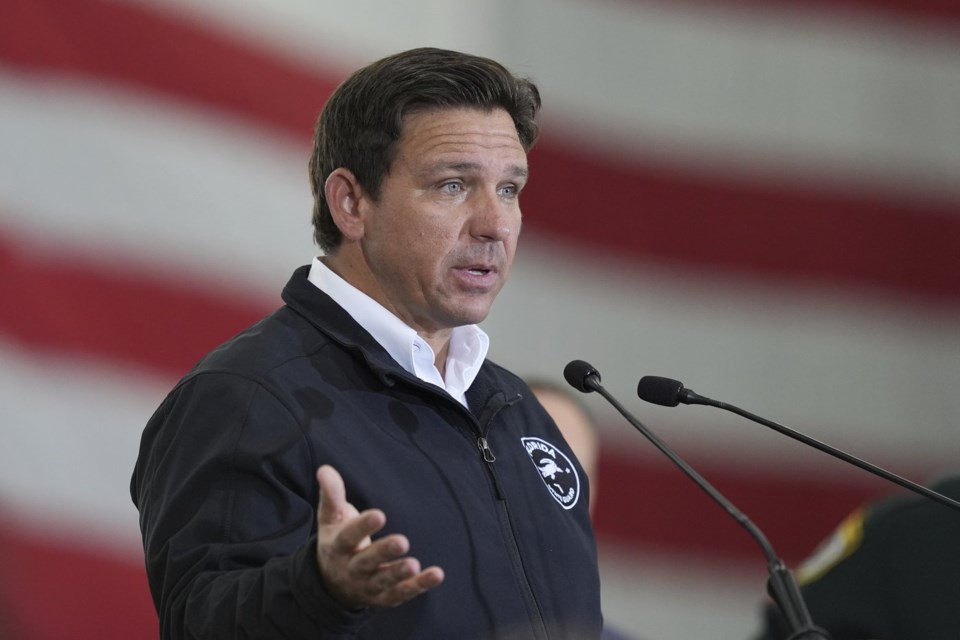TALLAHASSEE, Fla. (AP) — For six years, had a firm grasp on Florida's legislature. In his second-to-last legislative session, that is not the case.
Top lawmakers once stood beside DeSantis on issues ranging from and to and . These padded DeSantis' national profile ahead of his in 2024.
This year, the Republican governor looked to enforce President Donald Trump’s , remove state property taxes and address . Instead, his influence dwindled as fellow Republicans publicly defied his directives and even raised questions about his .
The Legislature adjourned the legislative session late Friday without a budget prepared to be signed by DeSantis, who wields the power of the to only approve specific appropriations in a budget package. Lawmakers extended the session until early June after announcing they have a framework for a budget. The governor would need to sign it before July 1, when the fiscal year begins.
The opposition presents a whole new challenge for the term-limited governor who may have aspirations to . And DeSantis has been amping up his rhetoric against legislators, labeling them the “House of Pettiness.”
Here are some key issues that didn't necessarily go in DeSantis' favor:
Lawmakers defied DeSantis on immigration
In January, Republican lawmakers opened and then immediately ended a on Trump's immigration agenda. Determined to tackle the issue on their own terms, they then gaveled back in, tossed out the governor's proposals and presented their own.
The rebuke to DeSantis would have been unthinkable in previous years.
A weekslong standoff ended with the negotiated immigration measures, which went beyond Trump's executive orders by mandating the death penalty for immigrants without legal status who commit capital offences in Florida.
Investigating the Florida first lady's key initiative
A Florida House subcommittee began a probe of , an initiative by First Lady Casey DeSantis.
Initially, it focused on a $10 million donation to the Hope Florida Foundation as part of a $67 million settlement between Centene Corporation, the state's largest Medicaid contractor, and a state agency.
DeSantis had asked legislators to create a Hope Florida Office under the governor's oversight. This would have helped boost the first lady's key initiative ahead of the 2026 election, when she is expected to campaign to replace her husband as governor.
Instead, DeSantis has spent weeks criticizing lawmakers' probes into the initiative, accusing lawmakers of drawing negative attention toward the initiative to “attack the first lady.”
Rep. Alex Andrade, who chaired the state subcommittee, announced April 24 that the investigation had ended and he was “firmly convinced” several parties were involved in a misuse of $10 million in Medicaid funds.
A budget backfires on DeSantis’ wish list
In February, the governor recommended his own $115.6 billion budget proposal for lawmakers to consider.
The proposal included key measures such as $505 million for immigration enforcement and $1.5 billion for Everglades restoration and water quality projects. It also had $2.2 billion in tax relief through some provisions like repealing business rent tax and providing more sales tax holidays.
Yet the still haven't agreed on a budget. House Speaker Daniel Perez told lawmakers to expect to return in June to finalize budget approvals prior to the effective date in July.
The House is seeking a smaller $113 billion budget, contrary to the Senate's $117.4 billion spending plan. One main provision in the House is a 0.75% cut to sales tax, which DeSantis has lambasted. He is instead pushing to roll back the state's property taxes. The Senate plan doesn't include that sales tax cut.
Throughout April, DeSantis repeatedly criticized the House for disagreements on the budget, whether related to Everglades restoration, law enforcement funding or tax cuts.
“They are the least-productive Florida House of Representatives that we have had in the modern history of the Florida Republican Party,” DeSantis said in an April 16 press conference in Fort Myers.
Costly condo woes
The initial special session for immigration in January also was meant to address condominium issues, since owners are facing hikes in property insurance rates and increased association costs. Instead, legislators focused on these provisions in the final weeks of session.
A 2022 law means condo owners have faced higher costs because associations are legally required to have enough reserves for major repairs. The law also requires a survey of reserves every decade.
This session, lawmakers aimed to relieve some of these cost hikes for condo owners, which mostly affect residents in South Florida and retirees on fixed incomes. The bill was sent to the governor Wednesday, allowing condo associations to fund reserves through lines of credit and give residents more flexibility to pause payments to their reserves while handling repairs and maintenance.
In the weeks leading to the bill's passage, the House and Senate presented two different versions, with the House version widely criticized by the governor. In April, DeSantis said the House bill would allow people to be “driven out of their homes” and “pave the way for developers to make more money.”
“Let's recognize that these consequences are not what we want, and let's provide reforms to be able to keep people in their condo units," DeSantis said of the House version.
Stephany Matat, The Associated Press




